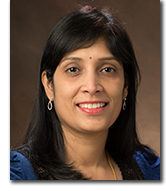
- associate professor in the Department of Mathematics
- from Chennai, India
- teaches both mathematics and mathematics education courses at the undergraduate and graduate (to practicing teachers) level
- passionate about mathematics/statistics and their inter-relationships and connections to education and society
Background
"I was born and raised in Chennai, a city in southern India. When I was young, math and science were deemed prestigious subjects in school, and it was a given that you would take them. Chemistry was my favorite subject, and in fact, I almost enrolled in a bachelor's program in chemistry but chose to go with mathematics instead.
"I received a bachelors and a masters degree in mathematics from the University of Madras in Chennai. India follows the imported British education model, and I was able to complete a research degree Master of Philosophy (M. Phil) in mathematics, which is a pre-requisite for pursuing a doctoral degree. After moving to the United States, I completed a doctorate in mathematics education at Illinois State University."
Teaching
"I could have pursued a number of careers with a math major, but my strongest passion was for teaching it—that's why I continue doing so to this day!
"I started my teaching career very early. When I was in 12th grade, I began tutoring my neighbor's kids as a means of supporting my own education. Throughout my undergraduate and graduate years, I continued to tutor students in grades K-12.
"My first professional teaching job was as a lecturer at an engineering college in Chennai. This institution served minority students: those who did not speak English or Tamil (Chennai's local language) as their first language. These experiences exposed me to the challenges of and opportunities for teaching mathematics meaningfully to students who did not always learn English as their first language.
"At Miami, I teach both mathematics and mathematics education courses to education majors, mostly K-12. It is one thing to teach mathematics, but it's another thing to teach mathematics for teachers. I like teaching the way I would want students to teach my own children. When I teach, I attempt to model some of the best practices for my students. I would like for them to understand that I am just one model, and there can be many other living examples that model best practices.
"This list is incomplete without those classroom teachers who exude a passion for teaching mathematics. We use small group discussions, hands-on techniques, the discovery approach, and inquiry-based learning. In all my courses, I strive to facilitate a learning environment that offers students a broadened context for exploring the socio-political-cultural aspects of mathematics education.
"I like interacting with students, and I love the a-ha! moments that they experience when given the time, space, and opportunity to discover ideas on their own. Although I teach them, I cannot understand for them, so it's up to that individual to develop their own understandings. That is what I strive to help them do, and it's what I enjoy most when I see them. That moment of discovery always brings a huge smile to my face!"
Research
"My primary research interests lie in the domain of ethnomathematics (introduced by Brazilian mathematician Ubiratan D'Ambrosio) and its subsets (everyday mathematics and multicultural mathematics). I also focus on the teaching and learning of probability and statistics.
"Everyday mathematics refers to the mathematical practices (often frozen) of different groups outside school settings. Multicultural mathematics lays a special emphasis on equity and diversity issues specific to the teaching and learning of mathematics. Focusing on these inter-related genres of research enables me to attend to the socio-cultural aspects of mathematics education, articulate connections between academic mathematics and everyday mathematics, and respond to issues of cultural diversity.
"Before coming to Miami, I was engaged in my doctoral research, exploring how mathematics can be linked to everyday life. My goal is to discover how we can connect academic mathematics to other walks of life.
"Since coming to Miami, another area that I became passionate about is mathematics of different cultural groups. I became involved in the Myaamia Center, where I've learned how the concept of time plays out in Myaamia culture. People have been counting ever since civilization was formed, but counting is done in different ways by different cultures. I like to involve undergraduate students in this project.
"I also do research on how mathematics can be used for the advancement of humankind. This is not just in terms of technology innovations, since more and more we see how technology is being used to destroy parts of mankind. I'm really on the other side: how can you use mathematics to make meaningful advancements to mankind? That quest keeps me going everyday. It's what I can do in a small way from here in my classroom.
"Because of my special interest in statistics education, I regularly collaborate with faculty in the Department of Statistics on various project. I am currently getting ready to teach a graduate course in statistics for high school teachers, and I am investigating teaching practices that infuse statistics to explore issues of social justice. If we assign meaning to numbers and data, they become extremely powerful. For this reason, we have to treat them with utmost care in order to develop citizens that can be critical and caring consumers of data."
Outside the Classroom
"I love listening to music and dancing. I love watching my son play basketball and taking my daughter to her ballet classes.
"I also love to cook, especially Indian food, but I regularly attempt and enjoy cooking other international food. I am a vegetarian, however, so I stick to the vegetarian cuisine!"
[September 2015]
 Miami University Oxford, Ohio est. 1809
College of Arts and Science
Miami University Oxford, Ohio est. 1809
College of Arts and Science
 Miami University Oxford, Ohio est. 1809
College of Arts and Science
Miami University Oxford, Ohio est. 1809
College of Arts and Science